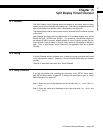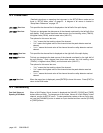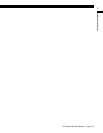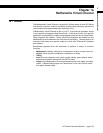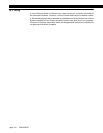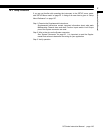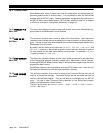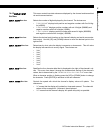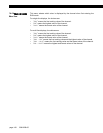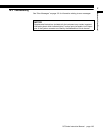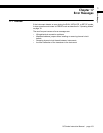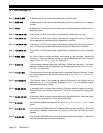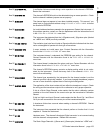
page 146 008-0608-00
16.4 Channel Menu
Each Mathematics Virtual Channel can have its configuration and SensoCode pro-
gramming examined via its channel menu. It is not possible to alter the SensoCode
program with the SETUP menu. Detailed instructions on operating the instrument in
the SETUP Menu mode can be found in “SETUP Menu mode” on page 23. A diagram
of all menus is located in “Setup Menu Reference” on page 157.
16.4.1
SENSOCODE P/N
Menu Item
This menu item displays the part number and revision level of the SensoCode pro-
gram loaded in this Mathematics Virtual Channel.
16.4.2
USER VALUES
Sub-Menu
This sub-menu contains menu items for each of the User Values. User Values are
constant numeric values that can be edited by the user and read by a SensoCode pro-
gram. The use of each User Value depends on the SensoCode program loaded in the
Mathematics Virtual Channel.
By default, the four items on this menu are
USER VALUE 1
,
USER VALUE 2
,
USER VALUE 3
and
USER VALUE 4
. However, a SensoCode program can alter the menu item text for each of
the User Values to make them more relevant to the operator. For example,
USER VALUE
1
might be re-titled
JELLY BEAN COUNT
.
16.4.3
VIEW SENSOCODE
Menu Item
This menu item allows the display of each “step” (either an operand or an instruction)
of the SensoCode program presently loaded into a Mathematics Virtual Channel.
Pressing [ENTER] will display the next step of the SensoCode program until the entire
program has been viewed.
SensoCode programs cannot be altered with the SETUP Mode menu; they can only
be loaded via the serial port with the Instrument Utility Software.
16.4.4
VIEW COMMANDS
Sub-Menu
This sub-menu contains menu items for each of the Command Strings that can be
used by a SensoCode program. Command Strings are text constants that can be
read by a SensoCode program. They are not able to be changed with the SETUP
menu. The use of each Command String depends on the SensoCode program
loaded in the Mathematics Virtual Channel.
The items on this menu are
COMMAND 0
,
COMMAND 1
,
COMMAND 2
,
COMMAND 3
,
COMMAND 4
,
COMMAND 5
,
COMMAND 6
, and
COMMAND 7
.




